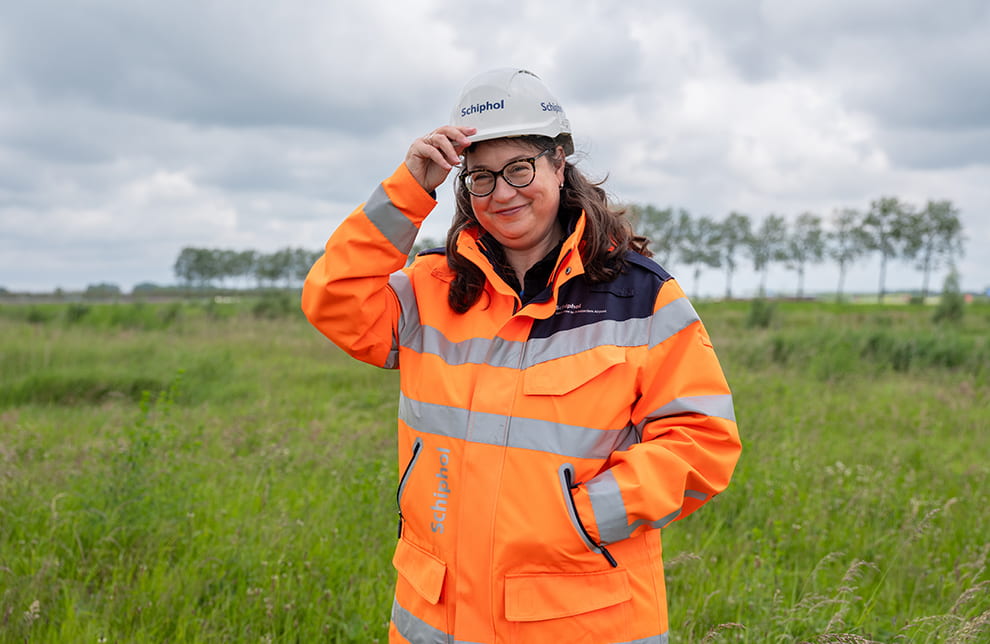'The Netherlands can benefit from the way we clean up PFAS': Interview project manager Katelijne de Wolf

Katelijne, what do you do at Schiphol?
In short, I am responsible for the smooth running of construction projects at Schiphol. As a project manager, I have collaborated on many different projects. Have you ever bought a croissant from the big Albert Heijn at Plaza? That’s the last finished project that I worked on. The role of project manager is multifaceted. You get involved in everything: schedule, budget, quality and everything in between. From arranging permits to updating fire safety.
How has the PFAS task at Schiphol been so far?
This is a unique project. In most construction projects, there is an external demand. For example, the law, or retailers or our operation demanding better facilities. However, we initiated this PFAS project entirely on our own. In fact, we decided not to wait for the market to find a solution for PFAS. The beginning was quite uncertain, I can tell you. There’s no legislation around PFAS, which makes the permit process time-consuming and complex.
Isn't that part of such a new process?
That's right. The stakes are too high to think: 'we'll just put a facility here for a while'. That's not possible. We were already doing the digging and soil analysis. The fact that we are cleaning it up immediately is unique for Schiphol and the Netherlands. An approach that we can all benefit from.
What measures are you taking to ensure safety onsite?
We first investigated the risks of such a facility with internal and external experts. This included a soil risk analysis. We took this into account when designing the site. There was a risk of soil contamination with these activities. That is why we’re building the facility and the entire operation surrounding it on an impermeable floor. There will be a closed water system that prevents contaminated water from entering the soil, groundwater and surface water. We will not discharge water from the site. During dry periods, we’ll spray the clayey soil to prevent diffusion. During extreme precipitation, the basins won’t overflow because they can hold so much.
What does that require in terms of safety measures for personnel working on the site?
That’s a combination of instructions and technology, with nothing being left to chance. Besides all colleagues on site obviously knowing the safety measures, we prevent contamination by, for example, washing every car tire that leaves the site. They drive through a wheel-washing system.
Schiphol works with an external party that is supplying the facility. Don't you find it difficult to relinquish control?
It definitely doesn't feel that way. In the media you read words like 'experimenting' and that we are working on a 'completely innovative technology'. That's not the case. DEME's cleaning method has been around for twenty years. It was not suitable for PFAS-containing soils, until now. DEME also complies with all European directives and Schiphol requirements that are stricter than the law. We will also test run the facility for a month, with a Site Acceptance Test. If the facility does not meet our requirements, we won’t commission it.
What are you looking forward to in this project?
Two moments. The first is getting the permit. Schiphol is taking a financial risk because we have already ordered the facility, pending the permit. If we don’t get it, we lose the investment. On the other hand, if we only start ordering after we get the permit, it will take another nine months. We didn't want that either. You hear activist groups shouting: ‘we want change now because it is not happening fast enough’. If you look at how many steps we have to take to create this soil treatment facility, with permits, tests and adjustments before we can get started, they’re right. I would also prefer to start cleaning the soil now so that we can really work on a solution.
The second is starting production. We can clean the approximately 195,000 tonnes of contaminated soil in three years. We’ve applied for a seven-year permit. This includes one year of construction and dismantling, and three years of cleaning. That means we have three years of leeway. So, when we get the green light, we can clean more than is currently planned.
Is this facility a solution for the country-wide PFAS problem?
I am not saying that this approach is a solution for all contaminated land in the Netherlands. It is for the 195,000 tonnes that we have now. We did not produce the PFAS, but we are cleaning it up. You shouldn't leave something like that to future generations. I hope more people and organisations have or get the same mindset. Let's work together to find the solution for the next generation.